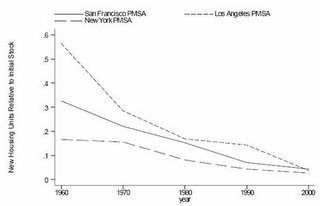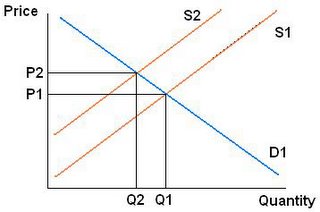Wal-Mart ... Enough Said
So, I have not seen anything on Wal-Mart in a while. I found an article that was written in 2003, but had a lot of valid and understandable points. It was written by Steve Lohr from the New York Times.
The first point you come across is that grocery prices drop 10-15% in markets where Wal-Mart enters. This is where people can see Wal-Mart as a monopoly because they are forcing mom and pop stores out of the local markets. This is very bad for the economy. I am not completely sure why, but in my mind it makes sense. I can best explain my train of thought as, if Wal-Mart enters the local market it puts great strain on the small stores. They are forced to shut down and people loose their jobs. There is less money to be spent. True, it’s nice to be rich, but if you just save your money or spend it at a less rate than you earn it, than you are not doing any good for the economy. That is less money for people who really need it to spend, which bring us to the next point in the article.
The article states, "‘Wal-Mart is the greatest thing that ever happened to low-income Americans,’" said W. Michael Cox, chief economist of the Federal Reserve Bank of Dallas. "’They can stretch their dollars and afford things they otherwise couldn't.’" If you think about it, Wal-Mart is awesome in the short run, but they are destroying the economy in the long run. Just think back. Once Wal-Mart started taking off is when our economy started slipping. I’m not saying that Wal-Mart is the sole reason for our poor economy, but it sure seems funny. Also, as it is stated in the article, cutting prices to drive out competition to raise prices later is typical behavior of a predatory corporation. Wal-Mart has started sending people to China and other places to cut costs, as well as, forcing lay offs and canceling orders. Sounds like hidden plans to me.
The last point I wanted to mention from the article is how Wal-Mart plans on adding 1,000 more stores in the US. They already have 3,000 stores across the nation, and they have started in on the national market. They are the largest private employer in Mexico as we speak. Could Wal-Mart really be taking over the world or are they screwing themselves? It was taught in class how in the MES Market Structure model that with a large output there is only room for one firm, which is a natural monopoly. Maybe I misunderstood, but 3,000 firms is a lot more than one. I hope they do fail, just so I can say I told you so to my grandpa when our economy goes up

